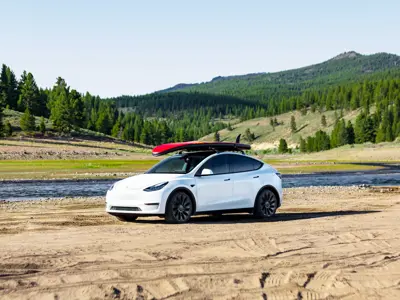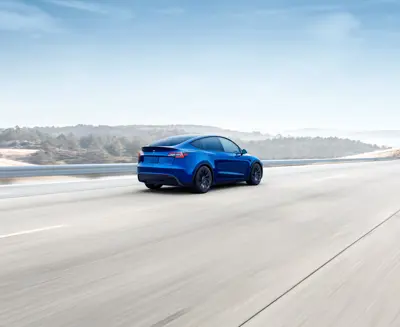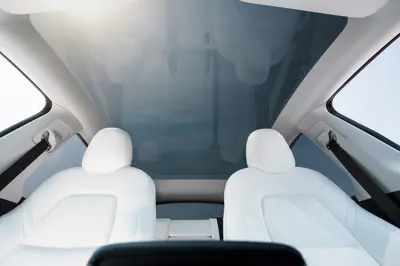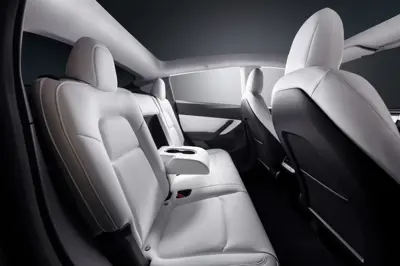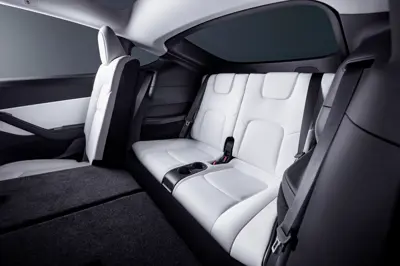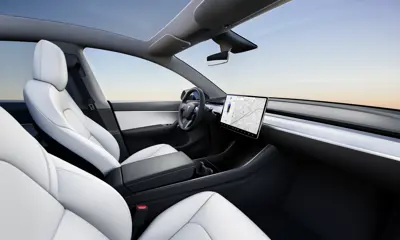Tesla Model Y Standard Range (GEN1)
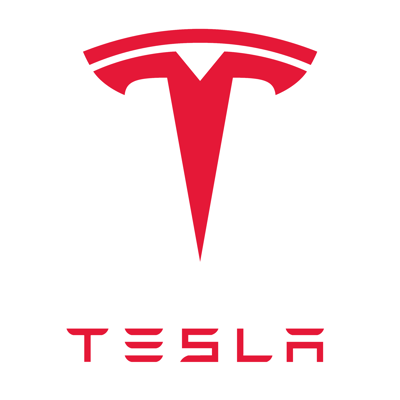
The Tesla Model Y Standard Range (GEN1) is an all-electric coupe SUV offering a WLTP range of up to 430 km (267 miles). EVKX.net has all the details you need.
Tesla Model Y Standard Range (GEN1)
We've organized this article into specific sections for easier navigation. Click the links below to jump to different areas or read on for the full article. Additionally, we offer an overview of the full specifications, an image gallery, detailed information about charging performance, and some online reviews. Our sections include:
Performance
The Tesla Model Y Standard Range (GEN1) delivers a solid performance with a maximum power of 255 kW (347 hp / 342 bhp) and a total torque of 420 Nm (310 lb-ft). It accelerates from 0 to 100 km/h (0 to 62 mph) in 6.9 seconds and reaches a top speed of 217 km/h (135 mph), making it competitive within its class.
Battery, Range, and Charging
The Tesla Model Y Standard Range (GEN1) is available with four battery options, each offering different specifications and performance metrics.
CATL LFP Europa/China market
The high-capacity battery has a gross capacity of 60.0 kWh and a net usable capacity of 55.0 kWh, providing a 5.0 kWh buffer (8.3%) for battery protection. With a nominal voltage of 340 volts, the system is classified as a 400-volt battery system, aligning with industry standards.
The Lithium-Ion battery utilizes LFP technology, which offers advantages and disadvantages compared to typical NCA/NMC batteries.
According to the WLTP (Worldwide Harmonized Light Vehicles Test Procedure) standard, the vehicle's range is 430 km (267 miles), with an energy consumption rate of 12.8 kWh/100 km (3 mi/kWh).
For more details about the range, see real-world data and range listings on this model’s range and consumption page.
The vehicle supports fast DC charging with a maximum power of 250 kW. Charging from 0% to 100% takes approximately 53 minutes, while a typical 10% to 80% charge takes about 28 minutes with an average charging speed of 82 kW.
Considering an additional 5 minutes for each charging stop due to driving interruptions, the optimal charging range is from 0% to 47%. This results in an effective charging speed, including time lost, of 87 kW, with each charging session taking about 18 minutes and 46 seconds.
In a 1000 km challenge at a constant speed of 120 km/h (75 mph) with an assumed consumption rate of 19.5 kWh/100 km, the trip would take about 9 hours and 56 minutes, needing five charging stops from 0% to 51%, totaling 97 minutes of charging time.
BYD LFP Europa/China market
The high-capacity battery has a gross capacity of 60.0 kWh and a net usable capacity of 55.0 kWh, providing a 5.0 kWh buffer (8.3%) for battery protection. With a nominal voltage of 340 volts, the system is classified as a 400-volt battery system, aligning with industry standards.
The Lithium-Ion battery utilizes LFP technology, which offers advantages and disadvantages compared to typical NCA/NMC batteries.
According to the WLTP (Worldwide Harmonized Light Vehicles Test Procedure) standard, the vehicle's range is 430 km (267 miles), with an energy consumption rate of 12.8 kWh/100 km (3 mi/kWh).
For more details about the range, see real-world data and range listings on this model’s range and consumption page.
The vehicle supports fast DC charging with a maximum power of 250 kW. Charging from 0% to 100% takes approximately 38 minutes, while a typical 10% to 80% charge takes about 18 minutes with an average charging speed of 126 kW.
Considering an additional 5 minutes for each charging stop due to driving interruptions, the optimal charging range is from 0% to 63%. This results in an effective charging speed, including time lost, of 111 kW, with each charging session taking about 19 minutes and 46 seconds.
In a 1000 km challenge at a constant speed of 120 km/h (75 mph) with an assumed consumption rate of 19.5 kWh/100 km, the trip would take about 9 hours and 36 minutes, needing four charging stops from 0% to 64%, totaling 76 minutes of charging time.
NMC 4850 US Market
The high-capacity battery has a gross capacity of 70.0 kWh and a net usable capacity of 68.5 kWh, providing a 1.5 kWh buffer (2.1%) for battery protection. With a nominal voltage of 340 volts, the system is classified as a 400-volt battery system, aligning with industry standards.
This Lithium-Ion battery utilizes NMC (Nickel Manganese Cobalt) technology.
According to the WLTP (Worldwide Harmonized Light Vehicles Test Procedure) standard, the vehicle's range is 430 km (267 miles), with an energy consumption rate of 12.8 kWh/100 km (3 mi/kWh).
For more details about the range, see real-world data and range listings on this model’s range and consumption page.
The vehicle supports fast DC charging with a maximum power of 250 kW. Charging from 0% to 100% takes approximately 86 minutes, while a typical 10% to 80% charge takes about 42 minutes with an average charging speed of 69 kW.
Considering an additional 5 minutes for each charging stop due to driving interruptions, the optimal charging range is from 0% to 35%. This results in an effective charging speed, including time lost, of 81 kW, with each charging session taking about 18 minutes and 46 seconds.
In a 1000 km challenge at a constant speed of 120 km/h (75 mph) with an assumed consumption rate of 19.5 kWh/100 km, the trip would take about 9 hours and 53 minutes, needing five charging stops from 0% to 37%, totaling 94 minutes of charging time.
NMC 21700 US Market Software locked
The high-capacity battery has a gross capacity of 70.0 kWh and a net usable capacity of 68.5 kWh, providing a 1.5 kWh buffer (2.1%) for battery protection. With a nominal voltage of 340 volts, the system is classified as a 400-volt battery system, aligning with industry standards.
This Lithium-Ion battery utilizes NMC (Nickel Manganese Cobalt) technology.
According to the WLTP (Worldwide Harmonized Light Vehicles Test Procedure) standard, the vehicle's range is 430 km (267 miles), with an energy consumption rate of 12.8 kWh/100 km (3 mi/kWh).
For more details about the range, see real-world data and range listings on this model’s range and consumption page.
The vehicle supports fast DC charging with a maximum power of 250 kW. Charging from 0% to 100% takes approximately 41 minutes, while a typical 10% to 80% charge takes about 24 minutes with an average charging speed of 120 kW.
Considering an additional 5 minutes for each charging stop due to driving interruptions, the optimal charging range is from 0% to 59%. This results in an effective charging speed, including time lost, of 109 kW, with each charging session taking about 22 minutes and 11 seconds.
In a 1000 km challenge at a constant speed of 120 km/h (75 mph) with an assumed consumption rate of 19.5 kWh/100 km, the trip would take about 9 hours and 30 minutes, needing three charging stops from 0% to 62%, totaling 70 minutes of charging time.
Onboard Charger
The standard onboard charger supports up to 11 kW for Level 1 and Level 2 AC charging, allowing a full 0–100% charge in about 5 hours and 0 minutes with a standard home setup.
Charge Port
The charge port is conveniently located at the left rear corner of the vehicle, facilitating easy access when backing into charging stations.
The connector types vary between different markets. This model uses NACS for North America and CCS Combo 2 for Europe. For complete specifications for all markets, refer to the full specifications.
Drivetrain
The Tesla Model Y Standard Range (GEN1) has a rear-wheel drive system supported by one motor on the rear axle.
The motor used is Permanent Magnet Synchronous Motor.
Suspension
The Tesla Model Y Standard Range (GEN1) features a double wishbone front suspension and a multi-link rear suspension, both equipped with monotube dampers and coil springs for a balanced and comfortable ride.
The standard suspension has a fixed height and damping characteristics.
Ground clearance with this setup is 167 mm.
Steering
Progressive steering is standard on the Tesla Model Y Standard Range (GEN1), automatically adjusting the steering ratio based on speed for improved control and comfort.
Brakes
The Tesla Model Y Standard Range (GEN1) is equipped with cast-iron disc brakes on both the front and rear.
The front discs measure 355 mm, while the rear discs are 335 mm.
Regenerative Braking
Regenerative braking in this model is primarily available through one-pedal driving. Unlike some models, Automatic regen or coasting is not available here.
This model offers three stopping modes for one-pedal driving:- Hold mode brings the vehicle to a complete stop using friction brakes
- Roll mode allows the vehicle to roll until it stops naturally
- Creep mode moves the car forward at low speed
Drivers can also adjust the regenerative braking strength when lifting off the accelerator. There are two levels of regenerative braking to choose from, allowing you to customize the driving experience to your preference.
Exterior
The Tesla Model Y Standard Range (GEN1), with dimensions of 4751 mm in length, 1921 mm in width, and 1624 mm in height, falls into the Compact SUVs category, also known as C-SUVs. These offer a balance between the practicality and maneuverability of smaller vehicles and the space and versatility of larger SUVs.
The Tesla Model Y Standard Range (GEN1) is available in a total of 6 paint colors, including both solid and metallic options.
The Tesla Model Y Standard Range (GEN1) offers multiple wheel options in different sizes, allowing you to customize your vehicle to suit your style and driving preferences. The available tire and wheel combinations include:
- 255/45 tires on 19" rims
- 255/40 tires on 20" rims
- 255/35 tires on 21" rims front and 275/35 tires on 21" rims rear
Narrower wheels improve consumption and provide a longer range, while wider wheels offer better traction and handling.
The car has four regular doors and a liftgate.
The liftgate is electric-powered and has a kick-sensor as standard.
There is only one roof option for this model.
The standard roof includes a large panoramic glass roof extending from the front to the rear, enhancing the interior's spacious and bright feel, thereby improving the mood and comfort of occupants. This glass is tinted to protect against heat from the sun.
The windows from the B-pillar and back are tinted, which enhances privacy and reduces glare and heat from the sun, making the interior more comfortable for passengers.
Tesla Model Y Standard Range (GEN1)
Interior
The interior of the Tesla Model Y Standard Range (GEN1) is designed with a minimalistic aesthetic, featuring medium-quality materials throughout. A traditional center console separates the driver and passenger, offering practical storage solutions and enhanced functionality.
You can choose between several interior designs.
Seats
Tesla Model Y Standard Range (GEN1) is available in a standard five-seat configuration, with an optional seven-seat layout for added versatility.
First Row Seats
The Tesla Model Y Standard Range (GEN1) offers a single type of front seat.
The following functionalities are available on the standard seat:
- Fore-and-aft adjustment (electrically adjustable)
- Recline adjustment (electrically adjustable)
- Height adjustment (electrically adjustable)
- Seat cushion angle adjustment (electrically adjustable)
- Heating
- Memory
Available in:
- Black leatherette upholstering
- Black/White leatherette upholstering
Tesla Model Y Standard Range (GEN1)
Second Row Seat
The second row features a standard three-seat bench with a 60:40 split, allowing each section to fold separately to increase cargo space.
Additional functionalities include:
- Recline adjustment (manually adjustable)
- ISOFIX (standard for outer seats)
Tesla Model Y Standard Range (GEN1)
Third Row Seats
The third row has an optional two-seat bench with a 50:50 split. Again, you can fold down the seats when not used to create a larger cargo capacity.
Tesla Model Y Standard Range (GEN1)
Climate System
There is one climate system available:
- 1-zone climate system: Supports only controlling one shared zone for the whole car.
A standard heat pump is included, which can save significant energy that the EV would otherwise use for heating in cold weather.
Comfort Features
The Tesla Model Y Standard Range (GEN1) includes several features to enhance comfort and convenience:
- Electrically Adjustable Steering Wheel
- Wireless Phone Charging
User Interface and Control
The control interface of the Tesla Model Y Standard Range (GEN1) is primarily screen-based, with minimal use of physical buttons or stalks. This streamlined design emphasizes digital interaction but may compromise ease of use for some drivers who prefer tactile controls.
This model features a single-screen layout, consolidating all driver and infotainment functions into one central display.
Key screen details:
- Center Dashboard Display: A 15.0-inch touchscreen positioned centrally on the dashboard. It functions as both the digital instrument cluster and the infotainment interface, displaying driving data, navigation, media, climate controls, and more.
The Tesla Model Y Standard Range (GEN1) does not include a head-up display, so driving information such as speed and navigation cues is not projected into the driver’s line of sight on the windshield.
Tesla Model Y Standard Range (GEN1)
Steering Wheel
The Tesla Model Y Standard Range (GEN1) is equipped with a single type of steering wheel:
- Circular Steering Wheel: This steering wheel features integrated heating for added comfort during cold weather. It also includes two multifunctional scroll wheels, allowing you to control the infotainment system, adjust the volume, change music tracks, and manage other key functions with ease.
Mirrors
Both the exterior and interior mirrors use conventional mirror technology to provide a clear view of the area behind the vehicle.
This model comes equipped with voice control as standard, allowing you to manage various functions through voice commands.
Infotainment
The Tesla Model Y Standard Range (GEN1) features a Tesla Infotainment system that runs on a custom-built, Linux-based OS, designed for a smooth and responsive user experience. The intuitive interface is optimized for ease of use, allowing drivers to navigate menus and settings with minimal distractions. The system supports over-the-air updates, ensuring continuous improvements and access to the latest features without needing a dealership visit. Streamlined voice command functionality and touchscreen controls provide quick access to essential functions, enhancing overall usability. The OS also offers a high degree of customization, enabling users to tailor their experience to their preferences.
Navigation System
The built-in navigation system uses detailed maps and offers advanced route planning, allowing you to define the target charge level at your destination or during charging stops. The system provides real-time traffic information ensuring an efficient and stress-free journey.
Preinstalled Apps
While the infotainment system does not include an app store, it comes with a selection of preinstalled third-party apps that run natively on the car's screen, independent of a connected phone. The available apps vary by market but include popular options such as:
- Spotify: Stream millions of songs, playlists, and podcasts directly from your car's infotainment system, providing endless entertainment options for your drive.
- Netflix: Enjoy movies and shows right from your vehicle's screen, perfect for entertainment while parked.
- YouTube: Watch your favorite videos, channels, and playlists on your car's infotainment screen, making it easy to stay entertained while parked.
- Twitch: Stream live gaming content or watch your favorite streamers on the go.
- TIDAL: Enjoy high-fidelity music streaming and exclusive content from your favorite artists, delivering a premium audio experience right to your vehicle.
- TuneIn: Access live radio stations, podcasts, and news from around the world.
Sound System
The Tesla Model Y Standard Range (GEN1) comes equipped with one sound system option:
- Tesla Premium Sound: Features en 13 speakers and delivers a maximum output of 560 watts.
Additionally, the model includes 4 USB-C connections as standard.
Mobile App
The Tesla Model Y Standard Range (GEN1) comes with a dedicated mobile app, available for both Android and iOS devices, allowing you to manage and monitor your vehicle remotely. The app offers a wide range of features designed to enhance your driving experience:
- Locate Your Vehicle: Easily check the current location of your car.
- Preconditioning: Preheat or cool your car before you start your journey for optimal comfort.
- Remote Parking: Effortlessly control your car to park or exit a parking space remotely.
- Lock & Unlock: Securely lock or unlock your car doors with a tap.
- Window Control: Open and close the windows from anywhere.
- Scheduled Charging: Plan and schedule charging sessions ahead of your trips.
- Adjust Charging Target: Set your desired State of Charge to start or stop charging as needed.
- Find Your Car: Trigger the horn or lights to help find your car in crowded areas.
- Route Planning: Plan your route and send it directly to your car's navigation system.
- Driving History: Review the details of your past trips.
Lights
The Tesla Model Y Standard Range (GEN1) comes equipped with advanced LED Matrix headlights. This adaptive system divides the traditional single headlight beam into multiple smaller rays, allowing the light controller to selectively turn them on and off to avoid dazzling other drivers. For enhanced safety, the headlights also include corner lights that illuminate the side when turning.
The taillights use LED technology, ensuring both high visibility and energy efficiency.
Advanced Driver Assistance Systems
The Tesla Model Y Standard Range (GEN1) features a range of standard and optional advanced driver assistance systems (ADAS) designed to enhance safety and comfort.
Safety Systems
Anti-lock Braking System (ABS): Standard on the Tesla Model Y Standard Range (GEN1), this system prevents the wheels from locking during braking.
Electronic Stability Control (ESC): Standard on the Tesla Model Y Standard Range (GEN1), this system improves the vehicle's stability and handling during sudden maneuvers or on slippery road conditions.
Lane-Keeping Assist (LKA): Standard on the Tesla Model Y Standard Range (GEN1), this system helps prevent the vehicle from drifting out of its lane.
It also includes a Lane Departure Warning system to alert the driver if the vehicle veers out of the lane.
Front Cross Traffic Assist (FCTA) : Standard on the Tesla Model Y Standard Range (GEN1), this driver assist system that helps drivers detect oncoming traffic when crossing an intersection or turning left or right from a stopped position.
Forward Collision Warning (FCW): Standard on the Tesla Model Y Standard Range (GEN1), this driver assist system helps drivers avoid or mitigate frontal collisions.
Automatic Emergency Braking (AEB): Standard on the Tesla Model Y Standard Range (GEN1), this system autonomously applies the brakes to prevent or reduce the severity of a collision if the driver does not react in time.
Automatic Emergency Steering (AES): Standard on the Tesla Model Y Standard Range (GEN1), this system assists in avoiding collisions by automatically steering the vehicle in an emergency.
Blind-spot Monitoring (BSM) : Standard on the Tesla Model Y Standard Range (GEN1), this side assist system helps to detect traffic in blind spots.
Driving Automation
The Tesla Model Y Standard Range (GEN1) offers driving automation at levels 2 or 3, depending on the equipment level.
With the standard Basic Autopilot level 2 system, you get the following driving automation features.
- Adaptive Cruise Control (ACC)
- Lane Centering Assist (LCA) /AutoSteer: keeps the car in your lane and slows down if needed in traffic. The system limits how long you can drive without touching the steering wheel.
With the optional Enhanced Autopilot level 2 system, you get additional driving automation features to the ones listed above:
- Advance cruise control that follows navigation and turns off and on major roads to reach the target.
- Automatic parking.
- Automatic Lane Change (ALC)
With the optional Full Self-Driving Capability level 3 system, you get additional driving automation features to the ones listed above:
- Traffic light control - follow traffic lights.
- Stop sign control - follow stop signs.
Sensors & Cameras
This model only uses cameras for its driver assist systems. This design limits the accuracy of the driving assistance systems and makes them more sensitive to weather than cars that also use radar and other sensors.
It uses eight cameras to register everything in the vehicle's environment.
Safety
Security and Access Technologies
The Tesla Model Y Standard Range (GEN1) is equipped with advanced security features to protect you and your vehicle. These include:
- Keyless Entry and Start: The vehicle's keyless entry and start system enables seamless access, allowing you to unlock and start the car without needing to remove the key from your pocket or bag.
- Phone-as-Key Functionality: With phone-as-key technology, you can use your smartphone as a digital key to unlock and start the vehicle, providing an additional layer of convenience and flexibility.
- Alarm System: An integrated alarm system monitors for unauthorized entry or tampering, providing alerts to help deter intrusions and keep your vehicle secure.
- Integrated Dashcam: The built-in dashcam records video footage of your journeys, capturing key details to provide added security, accountability, and peace of mind.
- Parking Surveillance: Using its suite of cameras, the vehicle actively monitors the surroundings while parked, offering enhanced protection through continuous surveillance.
Cargo Capacity and Towing Ability
The trunk offers a cargo capacity of 854 liters (30.2 CU FT). With the rear seat folded down, this expands to 2158 liters (76.2 CU FT).
On the roof, you can load up to 75 kg (165.3 lbs).
Additionally, there is a frunk (front trunk) with a storage capacity of 117 liters (4.1 CU FT).
The vehicle’s maximum weight is 2720 kg (5997 lbs), with a base weight of 2135 kg (4707 lbs). This allows for a maximum load of 585 kg (1290 lbs), including the driver and passengers. Note that some options may increase the base weight and reduce the maximum loading capacity.
A towbar is standard equipment on this model. The maximum total weight on a braked trailer is 1600 kg, and on and unbraked trailer, it is 750 kg (3527/1653 lbs).
Availability & Pricing
This model had a world premiere on 3/19/2019, and deliveries started in March 2020. This models has now been discontined.
Pricing
Pricing may vary depending on local conditions, incentives, and promotions. Below are the starting prices for select countries:
- $47,990 (USA)
- 449,990 NOK (Norway)
Alternative Models
Compare These Vehicles
Get detailed side-by-side comparisons of specifications, range, charging performance, and travel capabilities.
Complete Specs
Compare all technical specifications side-by-side
Range Analysis
Real-world range and charging performance
Travel Calculator
Plan trips and compare travel times

